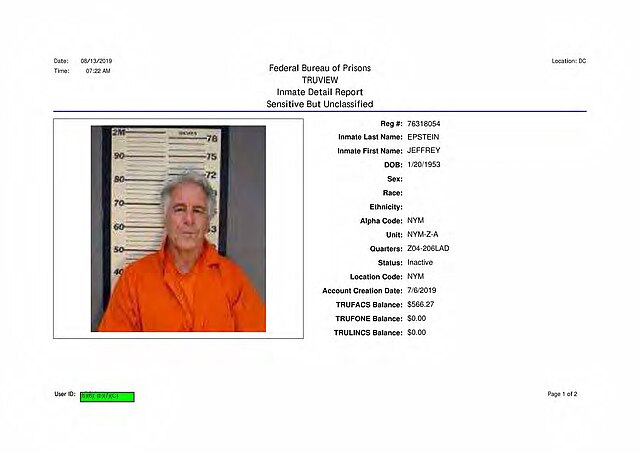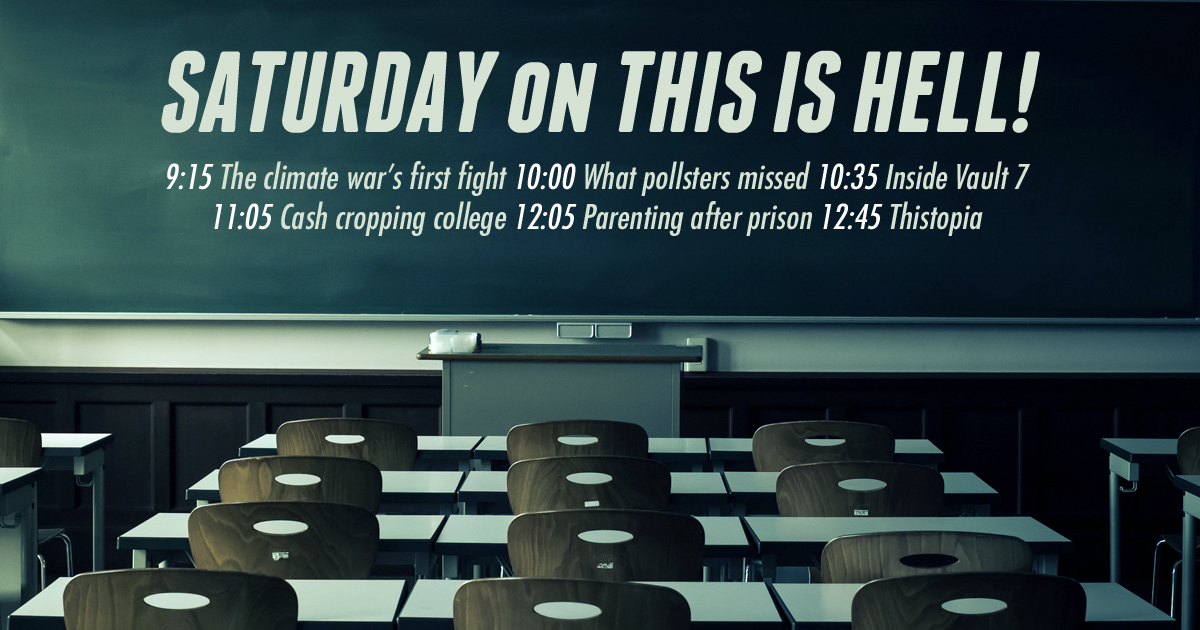Listen live from 9AM - 1:00PM Central on WNUR 89.3FM / stream at www.thisishell.com / subscribe to the podcast
9:15 - Journalist Kate Aronoff explains why the climate movement needs a new politics, beyond the Democratic establishment.
Kate is author of the cover story The Climate Movement Goes to War with Trump at In These Times.
10:00 - Political scientist Susan Kang pokes holes in the flawed gospel of political polling.
Susan wrote the article What Nate Missed in the latest issue of Jacobin.
10:35 - Journalist Marcy Wheeler unpacks the scope of the Vault 7 Wikileaks / CIA hacking dump.
Marcy wrote the articles Wikileaks Dumps CIA's Hacking Tools and No More Secrets: Vault 7 at her site emptywheel.
11:05 - Sociologist Tressie McMillan Cottom traces the for-profit college boom to our busted economy.
Tressie is author of the book Lower Ed: The Troubling Rise of For-Profit Colleges in the New Economy from The New Press.
12:05 - Journalist Victoria Law examines the legal labyrinth facing parents post-incarceration.
Victoria wrote the recent article Double Punishment: After Prison, Moms Face Legal Battles to Reunite With Kids for Truthout.
12:45 - In a Moment of Truth, Jeff Dorchen monitors our current dystopia.
Would have never thought it would be in such crisp, high-definition.
On This Day in Rotten History...
In 1238 – (779 years ago) – a hastily mustered Russian army led by Grand Prince Yuri II of Vladimir-Suzdal was attacked by an army of the Mongol Hordes led by the general Burundai at the Sit River, near what is now Sonokovo, Russia — some three hundred miles southeast of modern-day St. Petersburg. The Mongols had already sacked Prince Yuri’s capital, after which he and his brothers pursued a counterattack, only to find that they were surrounded. Yuri and his army tried to flee, but made it only as far as the Sit River, where the entire force was taken out in a bloody battle in which the Mongols also suffered heavy losses. This key event inaugurated two centuries of Mongol domination of modern-day Russia, Ukraine, and Belarus.
In 1519 – (498 years ago) – the Spanish conquistador Hernán Cortés made his first landing on the Yucatan Peninsula of Mexico, accompanied by some eleven ships, five hundred men, thirteen horses, and plenty of cannon, guns, and other weapons. Here, after claiming the land for the Spanish crown, Cortés began his campaign of conquest, forming key alliances with certain locals in order to vanquish the natives more generally. Cortés’s campaign would lead him up through Veracruz and then west to the great Aztec capital of Tenochtitlan. Arriving in that city with a large army, he met with the imperial ruler Moctezuma and established friendly relations with him in order to learn his weaknesses — the better to wipe him out two years later, destroy his city, and take possession of the empire, which he personally ruled for three years.
In 1986 – (31 years ago) – after playing a gig in Winter Park, Florida, with his bandmates in The Band, the singer and multi-instrumentalist Richard Manuel returned to his hotel room at a nearby Quality Inn, drank a bottle of Grand Marnier, entered the bathroom, and used a belt to hang himself from the shower curtain rod. An autopsy would later reveal cocaine in his bloodstream. In the Seventies, Manuel had suffered from depression and struggled with drug addiction and alcoholism, which had curbed his songwriting and damaged his singing voice. But in the Eighties, spending time in rehab had seemed to help. He died at the age of forty-two.
Rotten History is written by Renaldo Migaldi
Listen live from 9AM - 1:00PM Central on WNUR 89.3FM / stream at www.thisishell.com / subscribe to the podcast
9:15 - Journalist Rachel Aspden explains how the Arab Spring came to Egypt, and why it failed.
Rachel is author of Generation Revolution: On the Front Line Between Tradition and Change in the Middle East from Other Press.
10:00 - Writer Nicole Aschoff looks from the start of Trump's presidency to the end of neoliberalism.
Nicole wrote the article The Glory Days are Over for Jacobin.
10:35 - n+1 editor Dayna Tortorici makes the case for a Women's Strike now. Well, March 8th.
Dayna wrote the new piece While the Iron Is Hot: The case for the Women's Strike at n+1.
11:05 - Economist Clair Brown lays out the framework for a new compassion within economics.
Clair is author of the book Buddhist Economics: An Enlightened Approach to the Dismal Science from Bloomsbury Press.
12:05 - Political theorist Jodi Dean explains why the Communist Manifesto is more relevant, and needed, than ever.
Jodi wrote the introduction to a new edition of The Communist Manifesto from Pluto Press.
12:45 - In a Moment of Truth, Jeff Dorchen goes public on privatization.
On This Day in Rotten History...
In 1336 – (681 years ago) – four thousand village defenders of a fortess in Pilėnai, Lithuania, operating under the command of a prince named Margiris, were attacked by a force of the crusading Teutonic Knights, who sought to take their fortress and convert them to Christianity. Realizing they could not mount an effective defense, but unwilling to convert or otherwise allow the invaders a victory, the Lithuanian villagers burned down their own fortress and embarked on a mass suicide of the community, killing each other and themselves. Prince Margiris cut down his wife with a sword, killed his own guards and close advisors, and threw all their bodies into the flames before taking the fatal blade to himself. Villagers, following his lead, began burning their possessions and killing the people around them. According to one account, an old woman killed a hundred other people with an ax before using it on herself. A very few villagers did manage to escape the insanity on horseback, but the rest were found dead by the Teutonic invaders when they finally entered the blood-soaked fortress. For centuries, the mass suicide at Pilėnai has been celebrated by Lithuanians as an example of mass heroism, and it has inspired works of poetry, fiction, and music. But historians and archeologists still pursue contradictory theories as to where exactly the event took place.
In 1970 – (47 years ago) – one of the great American artists of the twentieth century, Mark Rothko, who used huge, vibrant fields of color in transcendent canvases full of tension and sensuality, was found dead in the kitchen of his studio, having sliced his arms open with a razor. An autopsy revealed that he had also overdosed on antidepressants. Rothko had suffered from depression, but had also developed an aortic aneurysm that was making it physically hard for him to paint. At the time of his suicide, he had just finished fourteen large canvases for the Rothko Chapel, under construction in Houston. Due to his illness, he needed two assistants to help him apply the paint, and he never lived to see the finished chapel. His suicide triggered an ugly legal battle between his heirs and his executors. And in recent years, some of his paintings have fetched eight-figure sums on the international art market.
Rotten History is written by Renaldo Migaldi
Listen live from 9AM - 1:00PM Central on WNUR 89.3FM / stream at www.thisishell.com / subscribe to the podcast
9:15 - Art historian Harriet Senie explores America's maintenance of national myths through war memorials.
Harriet is author of Memorials to Shattered Myths: Vietnam to 9/11 from Oxford University Press.
10:00 - Historian David Broder explains what the Anti-Trump left must learn from the anti-Berlusconi left.
David wrote the recent article Being Anti-Trump Isn’t Enough for Jacobin.
10:35 - Economist Dean Baker accounts for the economics of global trade in the Trump era.
Dean wrote the recent op-eds More Republican Handouts to the Rich and The Trouble With Trade: People Understand It for Truthout.
11:05 - Historian Osamah Khalil examines the illusions America sees when it looks to the Middle East.
Osamah is author of America’s Dream Palace: Middle East Expertise and the Rise of the National Security State from Harvard University Press.
12:05 - Journalist Kevin Davis discusses the impact of neuroscience in the criminal justice system.
Kevin is author of The Brain Defense: Murder in Manhattan and the Dawn of Neuroscience in America’s Courtrooms from Penguin.
12:45 - In a Moment of Truth, Jeff Dorchen awakens to reality, or something like it.
Wonder of wonders, all beings are invited to Jeff's latest segment.







